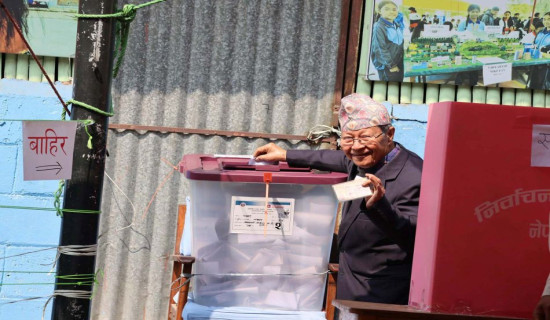- Thursday, 5 March 2026
Private Sector's Concerns
Private sector of an economy plays a crucial role in the overall success and functioning of a country's business and industry. In the current global economy, the importance of private sector cannot be overstated. The sector is known to drive innovation, create job opportunities, and generate economic growth, making it an indispensable component for any country's prosperity. The sector’s outsize influence in productivity growth, wealth creation and value addition have provided much-needed impetus to lift the economies of many countries. In Nepal, like in many other countries, privately run institutions and businesses have proven track record of outperforming their publicly run competitors. A 2023 report showed that it employed some five million national workforce, accounting for 87 per cent of the GDP in that year.
Take education sector as an example. For decades now, private schools have unfailingly outshone public schools – a fact evidenced by recent SEE results. Another is banking sector. Mostly privately owned, the sector is said to contribute over 7 per cent to national GDP, employing hundreds of thousands and facilitating to bring in remittances, one of the pillars of the economy, among other crucial functions. Yet another example is power sector. The country has recently been making a leap forward in hydropower generation. And the sector is currently producing half of that. It is unanimously agreed that, without the private sector's foraying into electricity generation, its remarkable growth couldn't have taken off.
But ever since the COVID-19 pandemic, the sector has been in the doldrums. Despite their immense contribution, private businesses were left alone to face the crippling impacts of the pandemic while their publicly-owned peers, with the helping hand of the government, is said to have weathered the storm. This has given rise to the accusations that the sector is being deprived of level playing field. Years later, now the sector is reeling from another major problem unleased by high inflation: fall in consumption as purchasing power of currency erodes. As demand for goods fall, factories, vast majority of which are private, are running below capacity or idling their machines and workers, exacerbating job crisis situation.
Aware of these long-standing issues facing the sector and to address them, the newly appointed Prime Minster KP Sharma Oli and the Deputy Prime Minister and Minister for Finance Bishnu Prasad Paudel, in a meeting with the Federation of Nepalese Chambers of Commerce and Industry (FNCCI) on Tuesday, jointly assured that all possible support would be provided to lift the sector on its feet. Underscoring its pivotal contribution in the economy, the Prime Minister has said that the government would adopt a policy to boost its morale. For his part, the Deputy Prime Minister has said that he is aware of the falling domestic demand for finished products alongside decreasing exports, as well as problems of dedicated feeder and trunk lines faced by factories. He has also vowed to solve the problem of delays in the payment of dues to the contractors.
No doubt these pledges come as a matter of hope for the businessmen and entrepreneurs. But what really matters at the end of the day is the result-yielding action. The pervasive gloom in the economy calls for the decisive step to restore the confidence of the common people, businessmen and entrepreneurs in the economy and also in the government. The pressing tasks ahead will put the government's resolve at test.

















